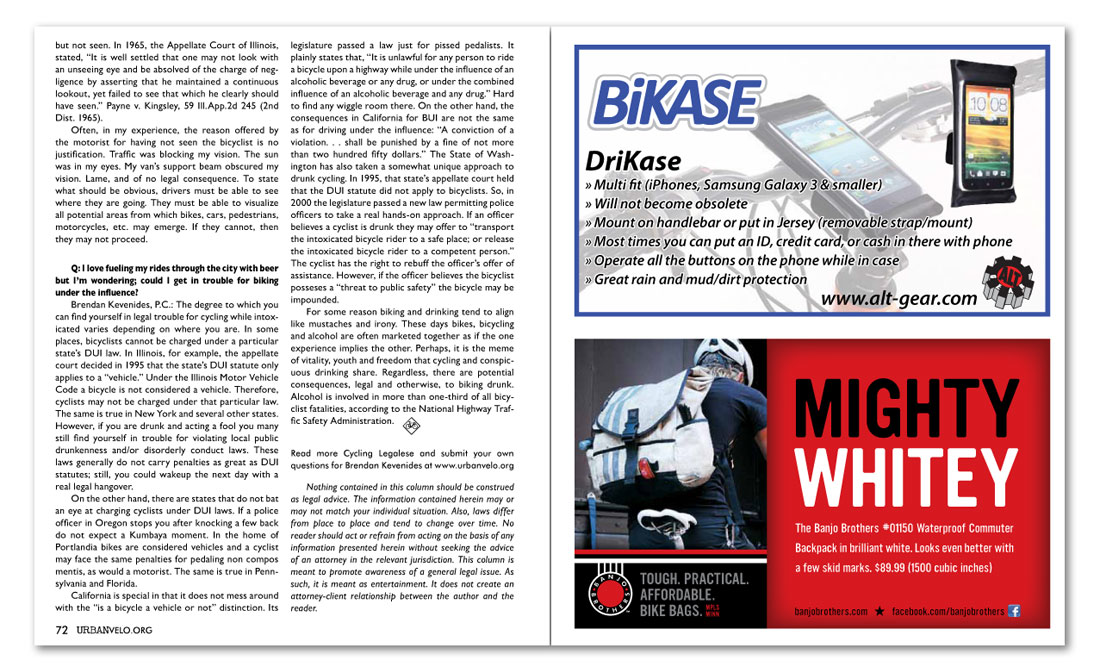


but not seen. In 1965, the Appellate Court of Illinois, stated, “It is well settled that one may not look with an unseeing eye and be absolved of the charge of negligence by asserting that he maintained a continuous lookout, yet failed to see that which he clearly should have seen.” Payne v. Kingsley, 59 Ill.App.2d 245 (2nd Dist. 1965).
Often, in my experience, the reason offered by the motorist for having not seen the bicyclist is no justification. Traffic was blocking my vision. The sun was in my eyes. My van’s support beam obscured my vision. Lame, and of no legal consequence. To state what should be obvious, drivers must be able to see where they are going. They must be able to visualize all potential areas from which bikes, cars, pedestrians, motorcycles, etc. may emerge. If they cannot, then they may not proceed.
Q: I love fueling my rides through the city with beer but I’m wondering; could I get in trouble for biking under the influence?
Brendan Kevenides, P.C.: The degree to which you can find yourself in legal trouble for cycling while intoxicated varies depending on where you are. In some places, bicyclists cannot be charged under a particular state’s DUI law. In Illinois, for example, the appellate court decided in 1995 that the state’s DUI statute only applies to a “vehicle.” Under the Illinois Motor Vehicle Code a bicycle is not considered a vehicle. Therefore, cyclists may not be charged under that particular law. The same is true in New York and several other states. However, if you are drunk and acting a fool you many still find yourself in trouble for violating local public drunkenness and/or disorderly conduct laws. These laws generally do not carry penalties as great as DUI statutes; still, you could wakeup the next day with a real legal hangover.
On the other hand, there are states that do not bat an eye at charging cyclists under DUI laws. If a police officer in Oregon stops you after knocking a few back do not expect a Kumbaya moment. In the home of Portlandia bikes are considered vehicles and a cyclist may face the same penalties for pedaling non compos mentis, as would a motorist. The same is true in Pennsylvania and Florida.
California is special in that it does not mess around with the “is a bicycle a vehicle or not” distinction. Its legislature passed a law just for pissed pedalists. It plainly states that, “It is unlawful for any person to ride a bicycle upon a highway while under the influence of an alcoholic beverage or any drug, or under the combined influence of an alcoholic beverage and any drug.” Hard to find any wiggle room there. On the other hand, the consequences in California for BUI are not the same as for driving under the influence: “A conviction of a violation. . . shall be punished by a fine of not more than two hundred fifty dollars.” The State of Washington has also taken a somewhat unique approach to drunk cycling. In 1995, that state’s appellate court held that the DUI statute did not apply to bicyclists. So, in 2000 the legislature passed a new law permitting police officers to take a real hands-on approach. If an officer believes a cyclist is drunk they may offer to “transport the intoxicated bicycle rider to a safe place; or release the intoxicated bicycle rider to a competent person.” The cyclist has the right to rebuff the officer’s offer of assistance. However, if the officer believes the bicyclist posseses a “threat to public safety” the bicycle may be impounded.
For some reason biking and drinking tend to align like mustaches and irony. These days bikes, bicycling and alcohol are often marketed together as if the one experience implies the other. Perhaps, it is the meme of vitality, youth and freedom that cycling and conspicuous drinking share. Regardless, there are potential consequences, legal and otherwise, to biking drunk. Alcohol is involved in more than one-third of all bicyclist fatalities, according to the National Highway Traffic Safety Administration.
Read more Cycling Legalese and submit your own
questions for Brendan Kevenides at www.urbanvelo.org
Nothing contained in this column should be construed as legal advice. The information contained herein may or may not match your individual situation. Also, laws differ from place to place and tend to change over time. No reader should act or refrain from acting on the basis of any information presented herein without seeking the advice of an attorney in the relevant jurisdiction. This column is meant to promote awareness of a general legal issue. As such, it is meant as entertainment. It does not create an attorney-client relationship between the author and the reader.
Banjo Brothers
BiKase